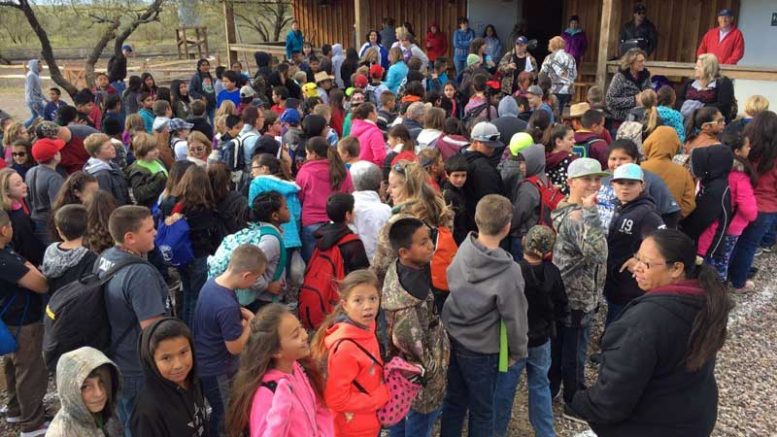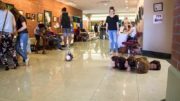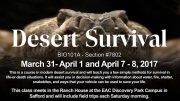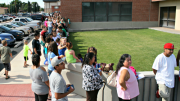By Lori Dugan
SAFFORD — Eastern Arizona College’s Discovery Park Campus (DPC) recently hosted approximately 250 fifth-grade students from Morenci, Duncan, Solomon and Ft. Thomas who participated in activities and lessons designed to teach them about the outdoors and how to protect the environment at “Conservation Day at Discovery Park Campus.”
“This outdoor activity is a sister-event to the annual ‘Earth Day at Discovery Park’ and an opportunity for more students to experience outstanding environmental lessons shared by individuals representing several groups involved with environmental protection and public use,” said Paul Anger, Director of the EAC Discovery Park Campus.
The students learned about several different aspects of nature and the environment as they rotated through nine, hands-on, 20-minute lessons with activities that helped to reinforce their understanding. Several of Freeport McMoRan’s wildlife partnerships participated with lessons and activities, and Maaike Schotborgh from the Wildlife Habitat Council presented a lesson on the importance of insects in our environment and how they pollinate plants and maintain a stable natural world.
Greg Clark from “Wild at Heart” brought his pet burrowing owl “Marty” to talk about local habitat restoration projects for the native burrowing owl populations. Jim Hogan had students play a board game that followed the ups and downs in the life cycle of the native Big Horn Sheep and the concerns for their safety, and Ann George shared an activity demonstrating the perils in the life of the native Mexican Free-Tailed Bat.
Byron James from the Arizona Department of Environmental Quality (ADEQ) had students use test kits to determine the quality of the Discovery Park pond’s water and explained the importance of water quality for a healthy ecosystem.
EAC instructor and Science Division chair, Dave Henson, and several EAC biology students described their work with the endangered native Chiricahua Leopard Frog and how the EAC biology department is using the specially built ranarium – a frog breeding facility at the Discovery Park Campus – to increase the numbers of these frogs and get them placed back into the wild to bolster their populations. Justin Johnson and Rachel Morhla, from the Gila Watershed Partnership (GWP), explained the importance of native plants and created “seed balls” from mud, mulch and native plant seeds that can be easily distributed over large areas to repair and restore depleted areas with native vegetation.
Ada-Mae Nandino and Mianah Santana of the University of Arizona’s Cooperative Extension Office shared “Beneficial Bugs” and described the variety of our native insects and the interactive roles they play throughout their life cycle. Heidi Blasius from the Safford District BLM talked about the fish species native to Arizona and had students make prints of these interesting-looking fish using fish forms covered in paint to print them on a piece of paper.
At the conclusion of the event, students enjoyed lunch around the rustic ranch house under the cottonwood trees while sharing their experiences of the day.
“The ‘Conservation Day at Discovery Park Campus’ provides a wonderful opportunity for agencies and groups involved in protecting and improving our environment (to have) a fun and educational way to share with local youth and educators the importance of balancing practical use and conservation in protecting the environment,” Anger said. “Children naturally have a love and interest in the natural world, and by teaching to that interest, combined with best use practices and hands-on activities, we can help them to better understand the world around them and inspire them to continually improve their lives, the environment and the world for generations to come.”
For more information contact Anger at EAC’s Discovery Park Campus at (928) 428-6260 or by email at paul.anger@eac.edu.













